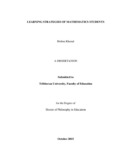Please use this identifier to cite or link to this item:
http://archive.nnl.gov.np:8080/handle/123456789/151| Title: | Learning strategies of mathematics students |
| Authors: | Khanal, Bishnu |
| Keywords: | Mathematics--Study and teaching Students--Mathematics |
| Issue Date: | 25-Dec-2018 |
| Abstract: | Mathematics students of Nepalese secondary schools, have difficulties in understanding, investigating and generalizing the mathematical situation. Therefore, the number of students failing in mathematics examinations is remarkably high. Only a small number of students seem to have gained success in this subject. In this context, the major purpose of conducting the study was to investigate the various learning strategies adopted by mathematics students, and the different contributing factors required for the promotion of learning strategies used by mathematics students in the secondary schools of Nepal. In the meantime, it tried to find out the differences in learning strategies used in terms of gender, ability group, school locations and school types, effective learning strategies associated with the students‘ best performance in mathematics, and the existing classroom practices prevalent in Nepalese secondary school mathematics classes along with the teachers‘ role to promote effective learning strategies. Data from 1394 students, selected through multi-stage sampling, were gathered using MSLQ tool. Classroom observations in two schools were done throughout a year to find out the practices of students and teachers followed by interview. Quantitative data were analyzed through mean, correlation, chi-square test, Univariate General Linear Model and regression analysis. Qualitative information was analyzed corroborating with theory and previous studies to conduct a more meaningful interpretation of the quantitative analysis. The results of the study indicated that students used nine learning strategies categorized by Pintrich, Smith and McKeachie which are characterized under ―cognitive strategies‖ and ―resource management strategies‖ to learn mathematics. Peer learning, elaboration and help seeking were the most preferred strategies adopted by students. However, girls were more likely to use peer learning, help seeking and rehearsal strategies, and boys were more likely to use elaboration, effort management and critical thinking strategies. Similarly, remarkable differences were found from observations and interviews between high achievers and low achievers in the use of learning strategies. High achievers used multiple learning strategies consciously with appropriate reasons whereas low achievers used them less consciously. There were differences in attitude, environment, participation and family background between high achievers and low achievers. Similarly, urban school students preferred peer learning, elaboration, help seeking and effort management strategies; however, rural school students mostly preferred elaboration and organizational strategies. Likewise, public school students preferred elaboration, help seeking and rehearsal strategies, whereas private school students mostly preferred peer learning, effort management, and critical thinking strategies, though students of both types of schools used all the strategies discussed in this study. However, rehearsal, time and study management, and peer learning were seen as the most effective learning strategies required for higher achievement. As the study found, different factors can influence the formation and promotion of learning strategies. Among them, teachers‘ teaching strategies, cultural value system towards mathematics education, students‘ background, environment, economic circumstance and attitude, mathematics curriculum design, goal oriented and career-related teaching and learning, and classroom management were found to be some of the important contributing factors. Despite their roles, these factors more particularly the teachers‘ teaching strategies and design of mathematics curriculum did not contribute much for the formation of effective learning strategies among the Nepalese students. The implication of the result of the study is that the effective use of learning strategies helps the students significantly for better performance in mathematics. Similarly, the knowledge of learning strategy use helps the teachers to rethink about their instructional design and establish relationship among the various teaching strategies adopted by them, and awareness on the different factors contributed to the formation of effective learning strategies helps all the stakeholders of mathematics education including curriculum designers, school administrators, and mathematics teachers to design mathematics curriculum, classroom practices and instructional strategies. |
| Description: | A thesis submitted to the Tribhuvan University, Faculty of Education for the degree of Doctor of Philosophy in Education, 2015. |
| URI: | http://103.69.125.248:8080/xmlui/handle/123456789/151 |
| Appears in Collections: | 300 Social sciences |
Files in This Item:
| File | Description | Size | Format | |
|---|---|---|---|---|
| Final PhD Dissertation Bishnu Khanal.pdf | 2.71 MB | Adobe PDF |  View/Open |
Items in DSpace are protected by copyright, with all rights reserved, unless otherwise indicated.